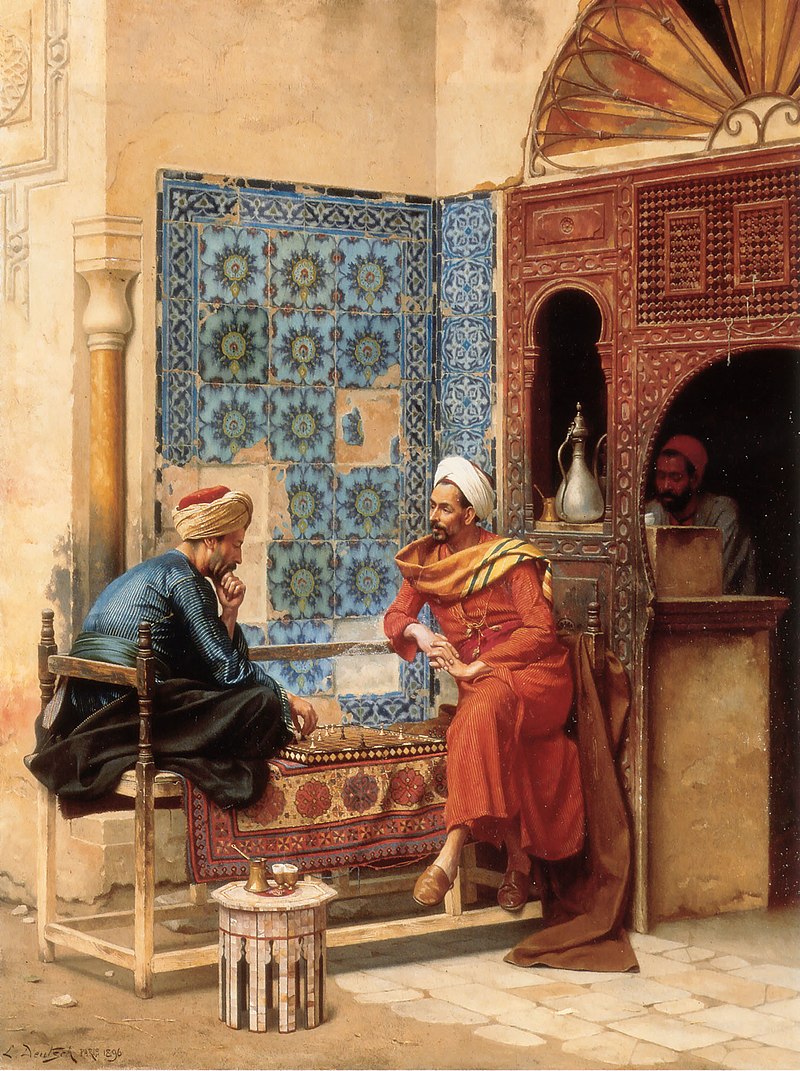The city of Anakar was on the edge of the vast desert, and from their place on the upper terrace everyone present could feel the warm wind that swept in with the dusk.
Uthman the chess master wandered his gaze across the scattered pieces, touching them with his eyes and letting his mind play out the connections between them.
If he moved a piece here, an invisible strand pulled another along with it. If he moved to attack, his battle lines would shift in support as a cohesive whole. Nowhere was there an individual token alone. Everything was part of an intricate, invisible pattern.
Across from Uthman sat his partner in the game, a dealer of spices who hunched cross-legged in the manner of the men of Zekh. The wispy vapor of each man’s hookah swam around his head and then drifted away on the heat-rippling air, wafting sweet smoke to the onlookers.
It was customary for Uthman to play in public, and a small semicircle had gathered at a respectful distance. They watched. And hoped to learn.
The chess master carefully extended a hand and slid one of his chariots down the board.
The spice dealer frowned. When Uthman had removed his hand, he narrowed his glittering eyes and bent closer. The Zekh was a shrewd, wily player, and Uthman knew that he would soon see—
The man’s shoulders slumped. Then, with a rueful flashing of white teeth in his dark face, he gently toppled his king to the chessboard in submission.
The watchers held their collective breath. They waited. This was why they had come.
Because, after his game, Uthman would take a long draw from his hookah. And then, if his opponent asked, Uthman would speak.
The Zekh was no fool. He knew that the game was simply the gateway, and the real reward would be in his opponent’s wisdom.
Uthman took a long draw from his hookah.
“Master,” the spice trader said, and though he played the game fluently his language was heavy with his native accent. “I have studied your games. Men of my country speak of you, and I learn from them how you play. When I come to Anakar, I also ask many men of your style and strategy. When we sit at the board, I know my own plans well. But,” he hesitated, trying to find the right words. “When we begin to play you are a hare, and I cannot catch you. Then you are a snake, and I stumble over you.”
The Zekh gestured at the scattered pieces between them. “Tell me how you play, because I still do not see.”
And Uthman’s eyes twinkled, as they did when he approved of the question. He let out the blue-grey smoke in a long, thoughtful sigh.
“You do well to speak of preparedness,” he said after a moment’s thought, “for if you bring no plan the game will take everything you have. But be careful that your plan does not become a cage, for if your strategy is rigid the game will take everything you have and your trust besides. Because a man feels the fool for having trusted in a faulty plan. And any plan is faulty that forgets everything it has not predicted.”
Another draw from the water pipe, and the crowd edged closer on soft-soled slippers.
“You do well to speak of seeing,” Uthman went on. “Because right seeing is what brings victory within your grasp. You must learn to see the board so that you are no longer obsessed by the individual pieces. You must begin to see patterns, rhythms, the dance of the game. Then, even more important, you must begin to see the space between the patterns, the empty unknown in every gap, the vast universe in the mind of he who you play. This space is the dance hall through which the dance spins and sweeps.
“Recognize that just as your own strategy was well-laid and firm in your own mind, so was mine elusive and obscured from your view. And just as I never doubted my own strategy, I was always in doubt of yours. So, you see that we do not play one against the other, but each of us against the unknown in his own plan. And in his own mind.
“It was a great general who said that no plan for battle survives contact with enemy forces. But it is a humble chess player who says this twilight that there is no enemy, just the unknown. And so, seeing the planned and the unplanned at once, the chess player adapts his plans and plays the board in front of him until conditions change once again.
“This is how you incorporate the unknowable and unpredictable into your strategy, by forcing nothing and accepting everything that is.”
In the crowd there was a young man with desert dust clinging to his clothes, and sand in his hair. And he listened intently to the chess master, for this was a lesson to remember.
No plan can prepare for every eventuality. Accepting that the unknown will undoubtedly arrive and staying open to a changing strategy transforms the infinite, ever-changing possibilities into prompts for improvement and space to dance.


Sweet website , super layout, rattling clean and apply friendly.
Your writing is like a breath of fresh air, offering clarity and insight in a world full of noise.
Your writing carries a quiet power, subtly shaping the way you see the world.
There’s an effortless beauty in the way you express complex ideas, making them feel as though they’ve always been obvious.
Reading your piece felt like walking through a lush garden of ideas, each one blooming with vibrant insights that invited both contemplation and joy. Your words move with such effortless grace, and the way you bring together seemingly disparate thoughts into a cohesive whole is nothing short of magical. It’s a rare gift to make complex ideas feel so accessible, yet so profound.
There’s an effortless beauty in the way you express complex ideas, making them feel as though they’ve always been obvious.